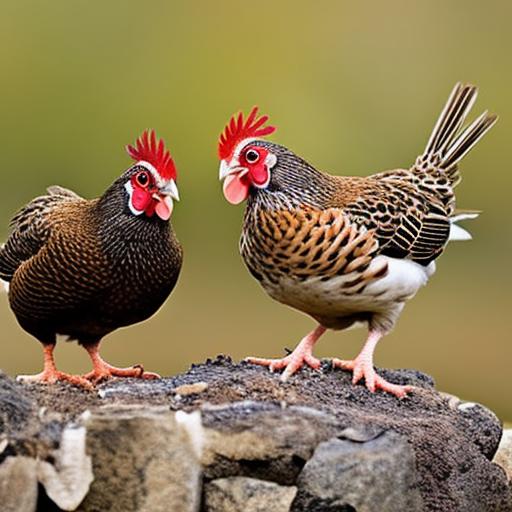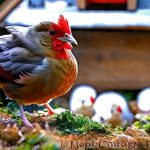Keeping chickens and quails together can be a rewarding and beneficial experience for backyard flock owners. Both chickens and quails are popular choices for those interested in raising poultry, and combining them in a mixed flock can offer a range of benefits. However, it is important to understand the differences between these two species and consider the necessary preparations before introducing them to each other.
Key Takeaways
- Raising chickens and quails together can be a beneficial and rewarding experience.
- Understanding the differences between chickens and quails is important for successful co-habitation.
- Benefits of keeping chickens and quails together include pest control, egg production, and entertainment.
- Considerations before housing chickens and quails together include space, shelter, and compatibility.
- Choosing the right breeds for co-habitation is crucial for a harmonious flock.
Understanding the Differences Between Chickens and Quails
Chickens and quails have distinct physical and behavioral differences that can affect their co-habitation. Chickens are larger birds with a more docile temperament, while quails are smaller and more flighty. Chickens are known for their scratching behavior, which can cause damage to delicate plants or gardens, while quails are less destructive in this regard.
Additionally, chickens and quails have different dietary needs. Chickens are omnivores and require a balanced diet of grains, vegetables, and protein sources such as insects or commercial feed. Quails, on the other hand, are primarily insectivores and require a higher protein diet. These differences should be taken into consideration when planning their co-habitation.
Benefits of Keeping Chickens and Quails Together
There are several benefits to keeping chickens and quails together in a mixed flock. One of the main advantages is pest control. Quails are excellent at foraging for insects, making them natural pest controllers in the garden. Chickens also contribute to pest control but may not be as efficient as quails due to their larger size.
Another benefit is egg production. Both chickens and quails are prolific layers, but they have different egg sizes and flavors. Chickens lay larger eggs while quails lay smaller eggs with a unique flavor. By keeping both species together, flock owners can enjoy a variety of egg sizes and flavors.
Furthermore, chickens and quails can complement each other in a backyard flock. Chickens are known for their calm and docile nature, which can have a calming effect on more skittish quails. Quails, on the other hand, are known for their alertness and can help alert the flock to potential dangers or predators.
Considerations Before Housing Chickens and Quails Together
While there are many benefits to keeping chickens and quails together, there are also potential challenges that need to be considered. One challenge is aggression. Chickens can be territorial and may exhibit aggressive behavior towards quails, especially during the introduction phase. It is important to monitor their interactions closely and provide enough space for both species to establish their own territories.
Another consideration is disease transmission. Chickens and quails can carry different diseases and parasites, and close contact between the two species can increase the risk of transmission. It is crucial to research and understand the health requirements of both chickens and quails before introducing them to each other. Regular health checks and proper hygiene practices are essential for maintaining a healthy mixed flock.
Choosing the Right Breeds for Co-habitation
When choosing breeds for a mixed flock of chickens and quails, it is important to consider their temperament and size. Some chicken breeds are known to be more docile and tolerant of other species, while others may be more aggressive or territorial. Similarly, some quail breeds may be more skittish or flighty, while others may be more adaptable to living with chickens.
In terms of size, it is generally recommended to choose chicken breeds that are similar in size to quails or slightly larger. This helps prevent any potential bullying or aggression from the chickens towards the smaller quails. It is also important to consider the space requirements for both species when choosing breeds.
Providing Adequate Space and Shelter for Chickens and Quails

Both chickens and quails require adequate space and shelter to thrive. When housing them together, it is important to provide enough space for both species to establish their own territories and minimize aggression. This can be achieved by providing separate areas within the coop or by creating separate coops for each species.
The shelter should also be modified or built to accommodate both chickens and quails. Quails prefer lower roosting areas and may not be able to access high perches designed for chickens. Providing multiple levels of roosting options can ensure that both species have suitable resting areas.
Feeding and Watering Chickens and Quails Together
Feeding and watering chickens and quails together requires careful consideration to prevent competition and disease transmission. It is important to provide separate feeding and watering stations for each species to ensure that they have access to their specific dietary needs.
Chickens and quails have different dietary requirements, as mentioned earlier. While chickens require a balanced diet of grains, vegetables, and protein sources, quails require a higher protein diet. Providing separate feeders with appropriate feed for each species can help prevent competition and ensure that both chickens and quails receive the necessary nutrients.
Similarly, separate waterers should be provided to prevent disease transmission. Chickens and quails can carry different diseases, and sharing water sources can increase the risk of transmission. Regular cleaning and disinfection of waterers are essential for maintaining a healthy mixed flock.
Managing Health and Hygiene for Mixed Flocks
Maintaining the health of chickens and quails in a mixed flock requires regular monitoring and proper hygiene practices. It is important to observe the behavior, appetite, and appearance of both species on a daily basis to detect any signs of illness or distress.
Regular health checks should include examining the birds’ feathers, eyes, beaks, legs, and vent area for any abnormalities or signs of parasites. Any concerns should be addressed promptly by consulting a veterinarian or poultry expert.
Hygiene practices such as regular cleaning and disinfection of the coop, nesting boxes, and feeding and watering stations are crucial for preventing the spread of diseases and parasites. It is also important to practice good biosecurity measures, such as limiting contact with other poultry or wild birds, to minimize the risk of disease transmission.
Potential Challenges and Solutions for Co-habitation
While keeping chickens and quails together can be a rewarding experience, there are potential challenges that may arise. One challenge is the potential for aggression between chickens and quails. If aggression occurs, it may be necessary to separate the birds temporarily or provide additional space and resources to minimize competition.
Another challenge is the risk of disease transmission. Regular health checks, proper hygiene practices, and biosecurity measures can help mitigate this risk. It is also important to quarantine new birds before introducing them to an existing flock to prevent the introduction of any diseases.
Is Keeping Chickens and Quails Together Right for You?
In conclusion, keeping chickens and quails together in a mixed flock can offer a range of benefits, including pest control, egg production, and complementing each other’s behavior. However, it is important to understand the differences between these two species and consider the necessary preparations before introducing them to each other.
Choosing the right breeds, providing adequate space and shelter, managing feeding and watering, monitoring health and hygiene, and addressing potential challenges are all important factors to consider when co-habiting chickens and quails.
Before deciding to keep chickens and quails together, it is recommended that readers research their specific situation, consult with poultry experts or experienced flock owners, and ensure they have the necessary resources and knowledge to provide a suitable environment for both species. With proper planning and care, keeping chickens and quails together can be a rewarding experience for backyard flock owners.
If you’re considering keeping chickens and quails together, it’s important to understand their dietary needs and living arrangements. While chickens and quails can coexist harmoniously, it’s crucial to provide them with suitable housing and a balanced diet. To learn more about what vegetables quails eat, check out this informative article on Poultry Wizard: What Vegetables Do Quails Eat? Additionally, if you’re looking for tips on creating a suitable floor for your chicken coop, this article on Poultry Wizard provides valuable insights: Floor of Chicken Coop. For those interested in building an A-frame chicken coop that can accommodate both chickens and quails, Poultry Wizard offers a comprehensive guide: A-Frame Chicken Coop.
FAQs
What are chickens and quails?
Chickens and quails are both domesticated birds that are commonly kept as pets or for their eggs and meat.
Can chickens and quails be kept together?
Yes, chickens and quails can be kept together in the same coop or enclosure as long as certain conditions are met.
What are the conditions for keeping chickens and quails together?
The coop or enclosure must be large enough to accommodate both types of birds and provide enough space for them to move around comfortably. Additionally, the coop must have separate nesting boxes for each type of bird, as chickens and quails have different nesting habits.
Do chickens and quails get along?
Chickens and quails can get along, but it depends on the individual birds and their personalities. Some chickens may be aggressive towards quails, while others may ignore them. It’s important to monitor the birds closely and separate them if any aggression occurs.
What are the benefits of keeping chickens and quails together?
Keeping chickens and quails together can provide a variety of benefits, such as increased egg production and pest control. Quails are known for their ability to eat insects and other pests, which can help keep the coop clean and free of pests.
Are there any risks to keeping chickens and quails together?
There are some risks to keeping chickens and quails together, such as the potential for disease transmission. Chickens and quails can carry different diseases, so it’s important to keep the coop clean and monitor the birds for any signs of illness.
Meet Walter, the feathered-friend fanatic of Florida! Nestled in the sunshine state, Walter struts through life with his feathered companions, clucking his way to happiness. With a coop that’s fancier than a five-star hotel, he’s the Don Juan of the chicken world. When he’s not teaching his hens to do the cha-cha, you’ll find him in a heated debate with his prized rooster, Sir Clucks-a-Lot. Walter’s poultry passion is no yolk; he’s the sunny-side-up guy you never knew you needed in your flock of friends!







